Thursday, March 23, 2023, marked the launch of the MuLaKiLa project in western Rwanda, whose ambition is to strengthen the resilience of the targeted area in the face of climate change. Rwanda, which is suffering from the consequences of global disruption, is gradually shifting towards a sustainable land use that will ensure a decent livelihood and diversify the population's sources of income. Through this project, several key players are joining forces to finance and implement sustainable agricultural practices around the Mukura Forest and Lake Kivu.
Officially launched in March 2023, the first season of the MuLaKiLa project takes root in western Rwanda, in the heart of a lush landscape made up of the Mukura Forest and the Lake Kivu watershed. It is one of the country's largest community-based restoration initiatives, whose main objective is to promote the sustainable management of 20,000 hectares of agrosystems made up of vegetable crops and perennial crops (coffee, tea). By involving a diverse group of local stakeholders, this large-scale project acts as a powerful catalyst for restoring the integrity of natural ecosystems while addressing the needs of the communities that rely on them.
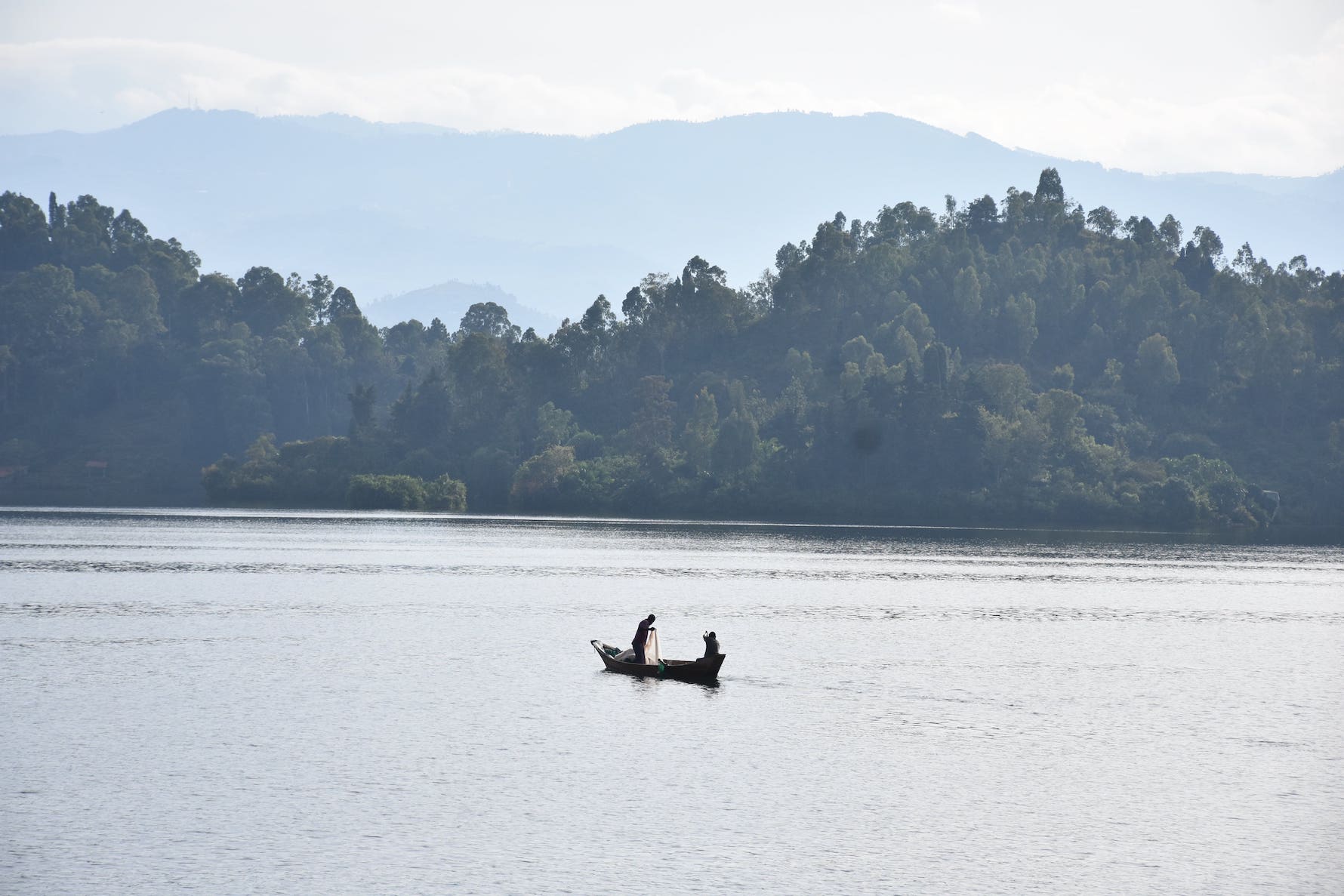
Official project launch
On March 23, 2023, a few days after the celebration of International Forest, Water and Meteorological Days, the launch of the MuLaKiLa project was celebrated during an official event in Kigali, bringing together a range of national and international stakeholders. The Rwandan government, represented by the Ministry of the Environment and the Rwanda Environment Management Authority (REMA) among others, attended the event. The private sector was also invited, and local tea companies including the Rwanda Mountain Tea Company made the trip. Several global organizations took part in the event, such as IUCN* and WRI**. This unifying kick-off reinforced the project's long-term roadmap and engaged stakeholders in fruitful discussions that will contribute to its success.
*IUCN = International Union for Conservation of Nature ** WRI = World Resources Institute
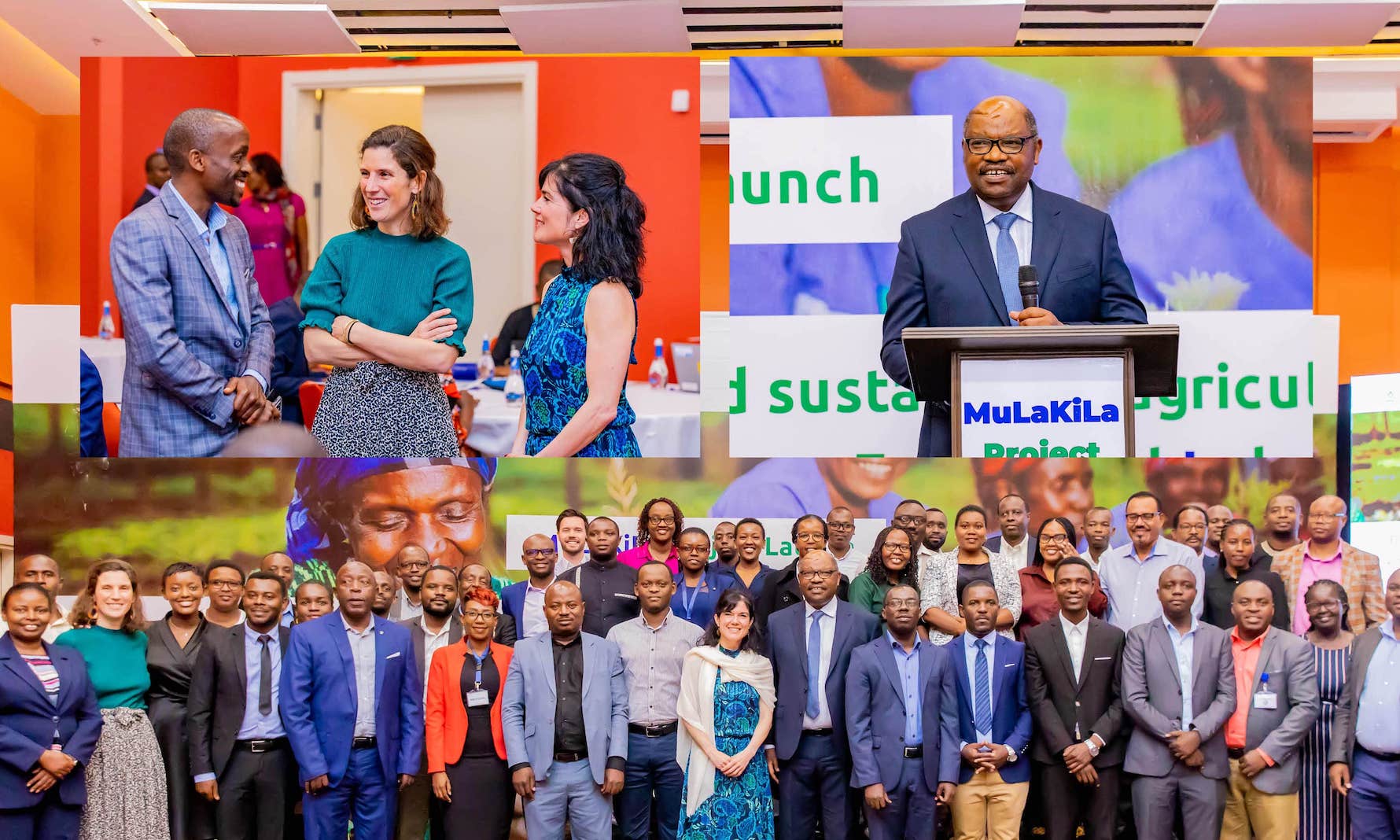
To support the start of the project, three members of the Reforest'Action team - Delphine, Carbon Project Manager, Marie, Climate & Biodiversity Solutions Senior Advisor, and Lisa, Impact Assessment Manager - extended their stay to the project area. Accompanied by our local partner ARCOS, they met with communities to lay the foundations of a promising collaboration.
Rwanda, land of resilience
Landlocked between the Democratic Republic of the Congo and Tanzania, Rwanda is a small state in the highlands of Central Africa. Enriched by its fertile, rolling, verdant landscapes, the “country of a thousand hills” has nothing to envy its neighbors.
A land of many colors, Rwanda contains some of the most remarkable natural ecosystems on the African continent. Green is everywhere in the horizon. In the north, the famous Volcanoes National Park, where Mount Karisimbi rises to over 4,500 meters, is home to mountain gorillas’ and golden monkeys’ families. To the south lies one of Africa's last primary forests, in the heart of Nyungwe National Park. These almost 1,000 km2 of age-old jungle are a haven for over 300 bird species, and a biodiversity jewel. An intense blue takes its source in this land of water, where the immense shores of the Great Lakes merge with the edges of an ocean. Yellow savannah shades color the vast territories of Akagera National Park, worthy of the finest safaris. Then comes red, a reminder of a country wounded by genocide, but also the color of eroded soil, washed away and degraded by man. A symbol of reconciliation and resilience, Rwanda is a rainbow, a multicolored gem that the MuLaKiLa project is committed to preserving and restoring.
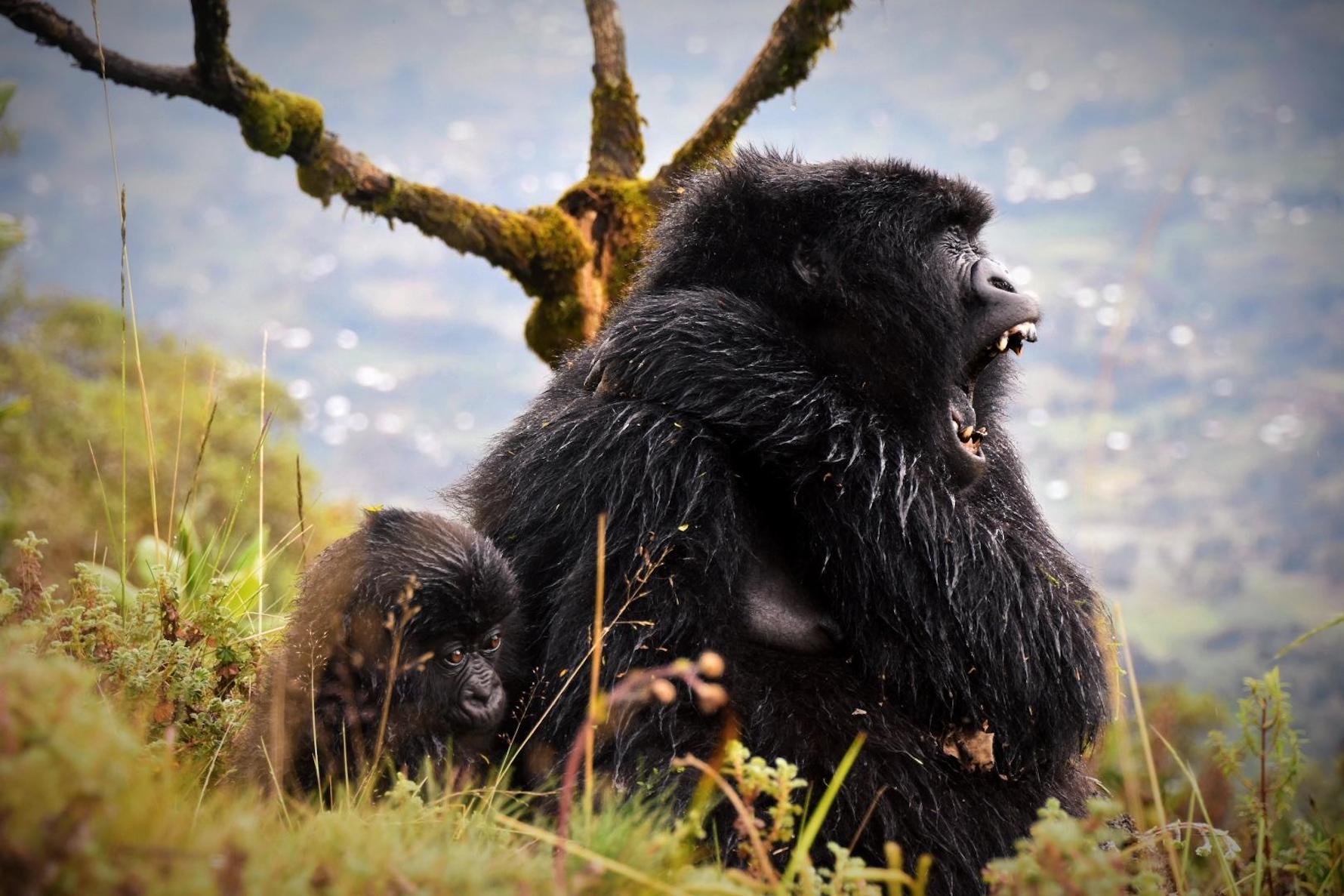
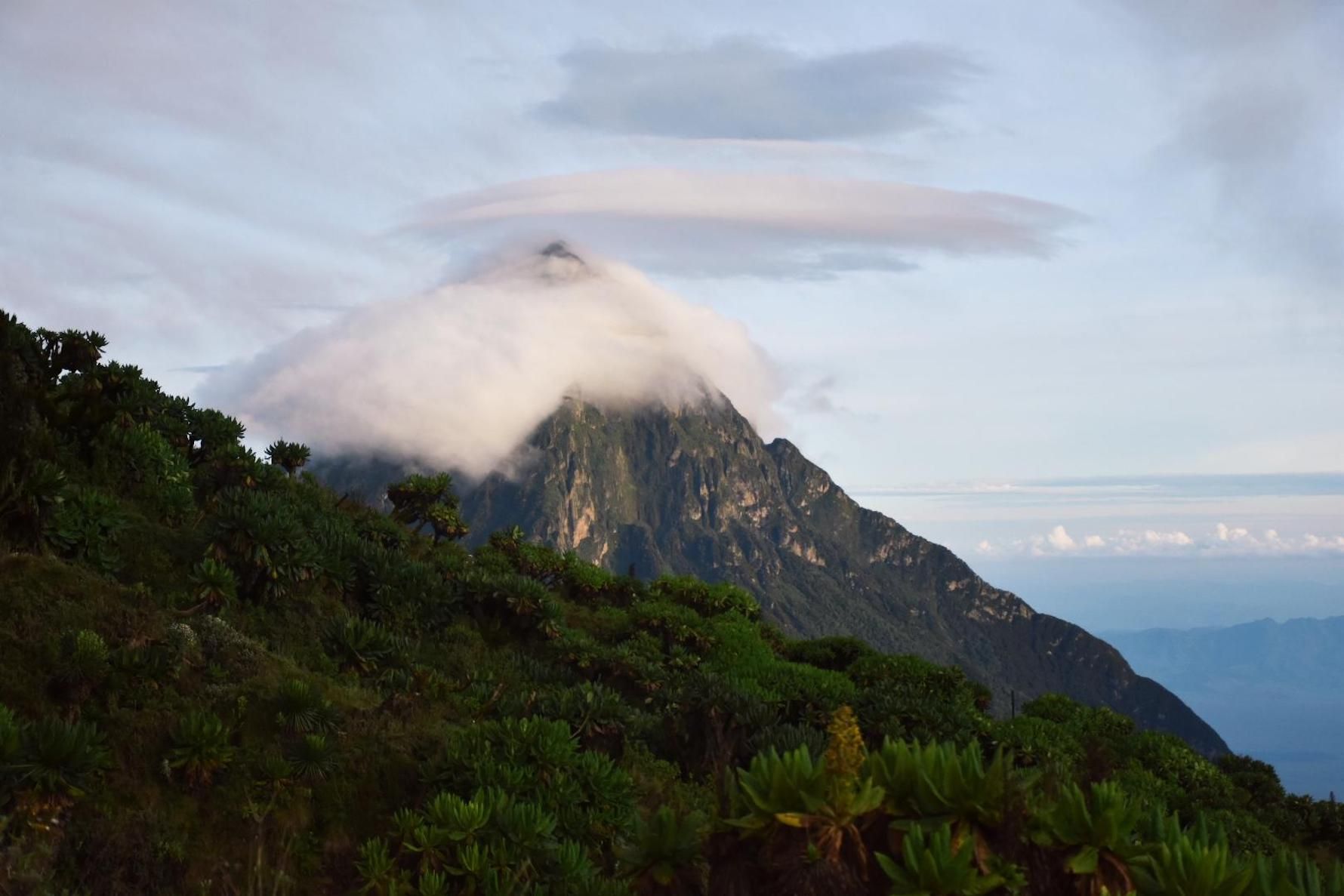
The environmental context
Land and forest degradation is a major environmental problem in Rwanda, particularly in the mountainous landscapes of the Rutsiro and Ngororero districts. Here, high population pressure led to heavy dependence on agriculture for food, combined with deforestation to access forest resources, particularly wood as fuel for cooking. Clearcutting and traditional farming practices leave soils bare, making them extremely vulnerable to erosion - 40%* of the country's cultivated land is currently threatened by erosion - and to the risk of landslides during the rainy season, itself exacerbated by climate change. These phenomena have cascading negative effects, such as the disruption of water cycle, on which depends the biodiversity of streams, rivers and, ultimately, of Lake Kivu. The loss of biodiversity, initially caused by the fragmentation of natural habitats inherent in land conversion, is yet intensified.
*Source: FAO
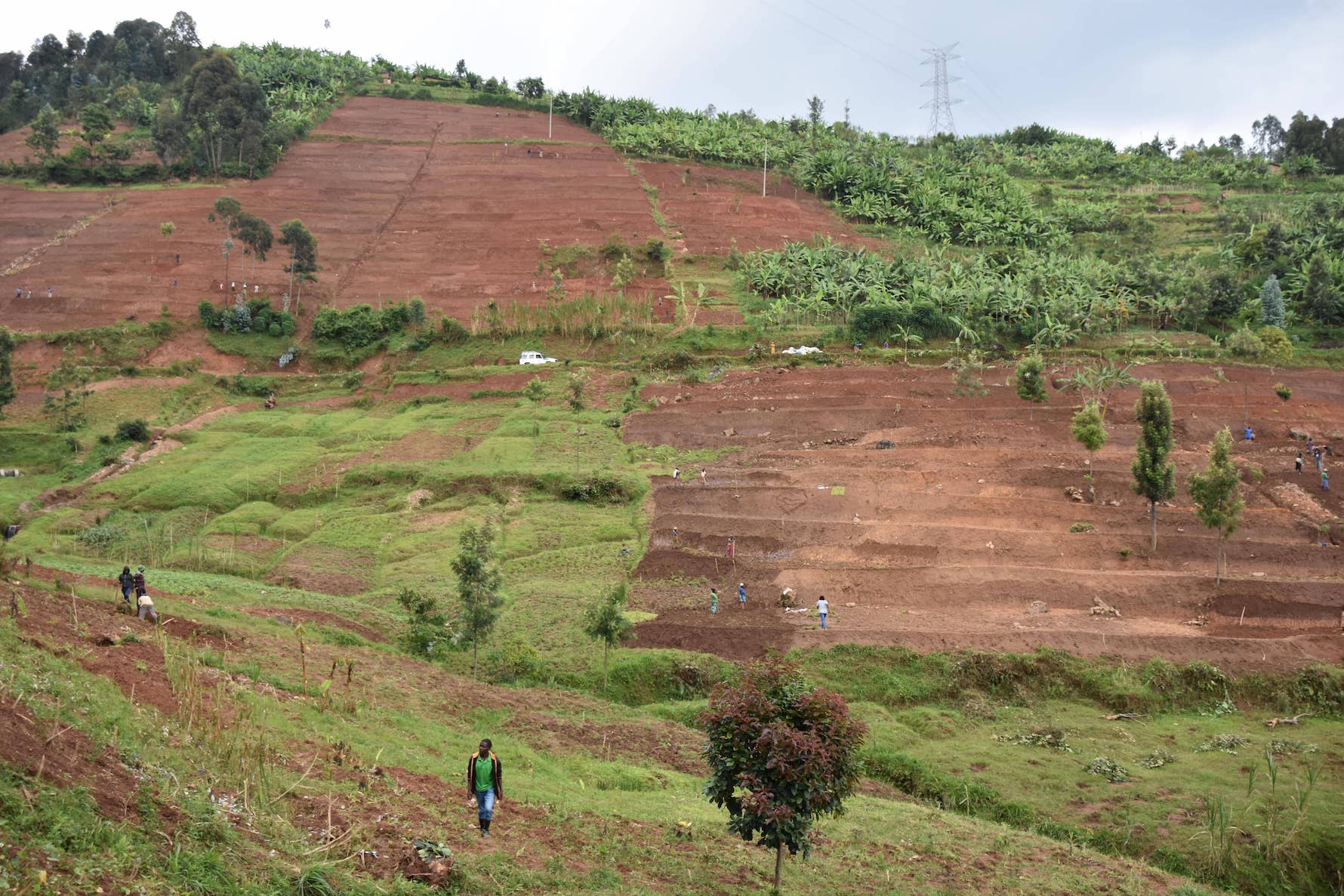
A country plagued by climatic disasters
On the night of May 2-3, 2023, numerous villages in the Western Province of Rwanda, where the project is located, were hit by deadly floods and landslides. Impressive mudflows killed at least 130 people, and more than 5,000 homes were destroyed. Rwanda regularly experiences torrential rains during the wet season, but this was the first time a rainstorm of this magnitude had been observed.
Extreme weather events have plagued Rwanda for decades. According to the UNDP*, the number of flood-related disasters worldwide rose by 134% between 2000 and 2023, while the UNEP** claims that Africa is warming twice as fast as the rest of the world. Naturally prone to disturbances, Rwanda has become a hotspot for global warming and is witnessing its deadly reality. In the western mountains, these cataclysms are responsible for the destruction of food crops. Nearly 600 million*** tons of soil are lost every year in Rwanda because of heavy rains, with sloping cultivated land losing the largest amount, as reported by the UNDP. In a country where farming is the only means of subsistence, this situation is a cause for concern, threatening Rwanda with famine.
In the mountain ridge belts, reforestation and forest - which are natural drainage areas - conservation as well as terraced land-use planning appear to be the best solutions for combating massive soil erosion and leaching, at a time when extreme events are becoming increasingly frequent.
*UNDP, United Nations Development Programme ** UNEP, United Nations Environment Programme *** In comparison, this is more than the total amount of soil lost in Europe every year.
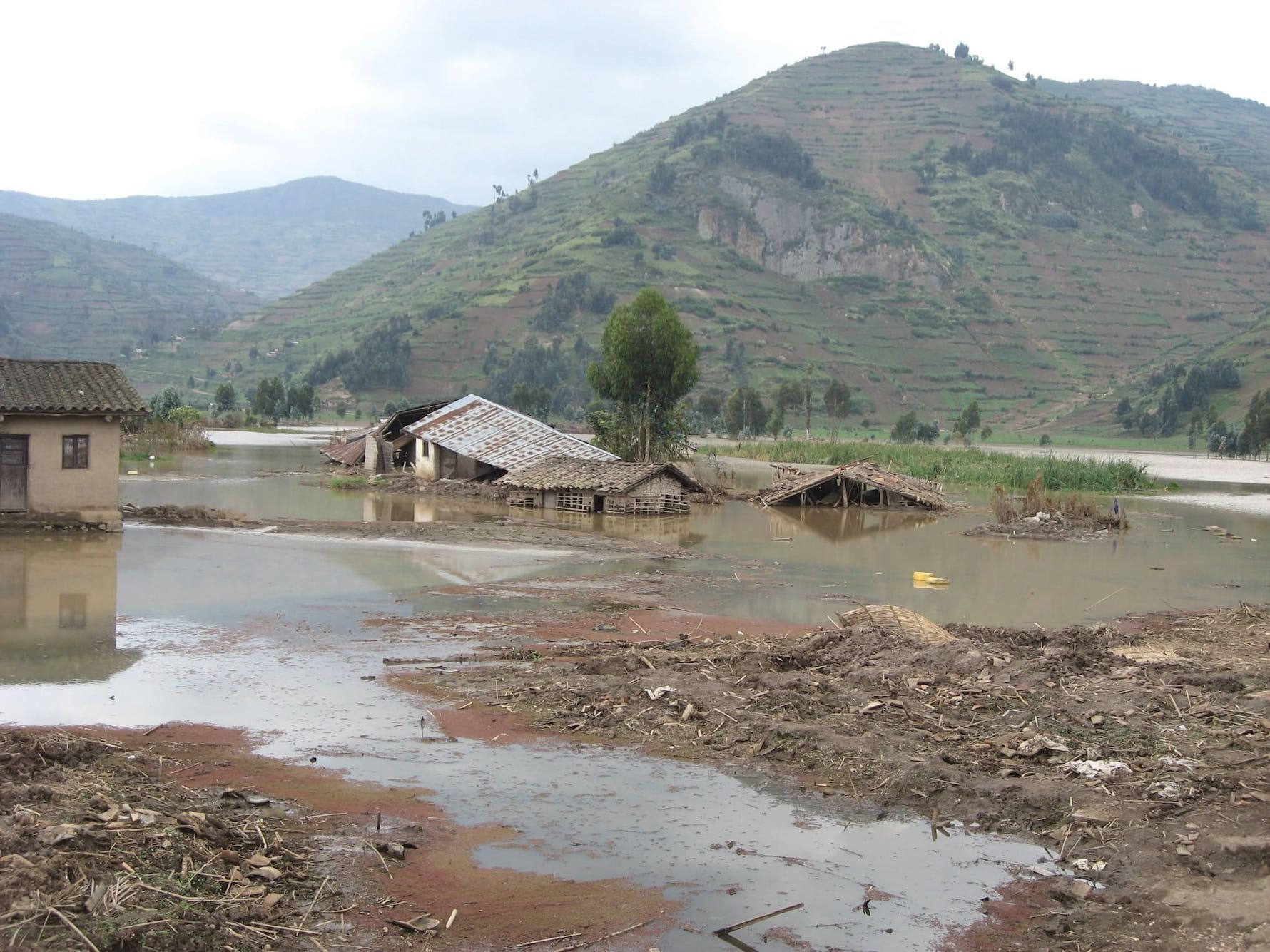
The socio-economic context
When you have sunk so low, in the hell of machetes and fear, getting back on your feet can seem like a utopian dream. And yet, after the 1994 genocide that caused the death of more than one million people, Rwanda has made this challenge a reality. Today, the country is moving forward despite the weight of poverty, but above all, is uniting to look to the future. Embodying hope, joy and renewal, music and dance are an integral part of Rwandan culture. Handicrafts, characterized by weaving, basketry and Imigongo (traditional patterns painting), have made this tiny African country famous on the international scene. However, despite its desire to shine, Rwanda faces particularly difficult socio-economic conditions.
An alarming level of poverty
With an estimated total population of 13 million people - 50% of whom are under 20 years old - Rwanda is the second most densely populated country in Africa. The international poverty line calculated in 2017 is set at $2.15*. This means that anyone living on less than $2.15 a day is considered to be suffering from extreme poverty. Rwanda's poverty rate, which fell from 75.2% to 53.5% between 2000 and 2013, has not decreased since. In 2016, poverty stood at 52%, meaning that more than half the population subsisted on less than $2.15 a day. Infrastructure that provides decent access to water and electricity is lacking, and basic services such as healthcare and education are deficient. As a result, the World Bank's Human Capital Index (HCI) is estimated at 0.38 in Rwanda, below the average for sub-Saharan Africa (by comparison, HCI in France is 0.9).
*Source: World Bank, 2023
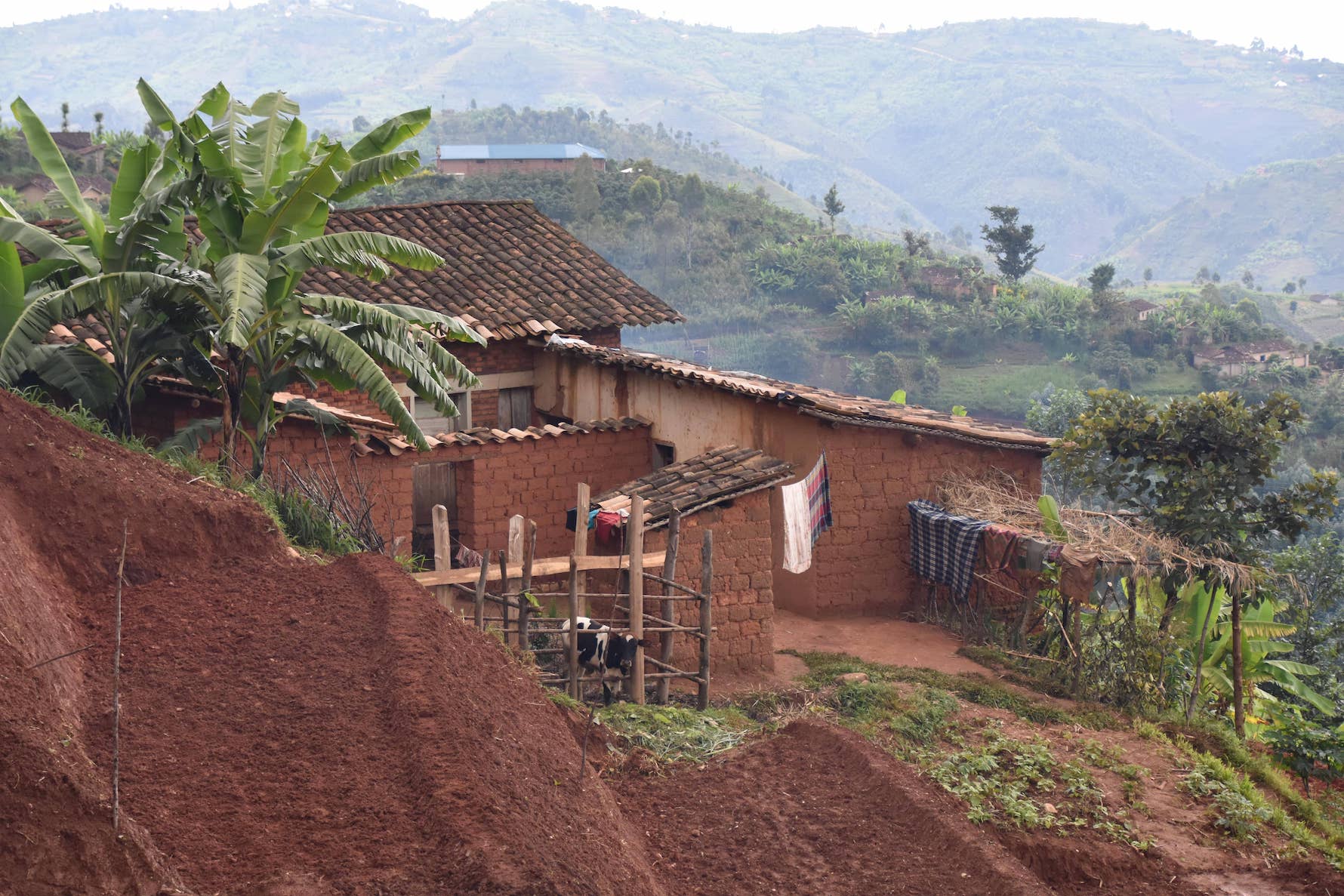
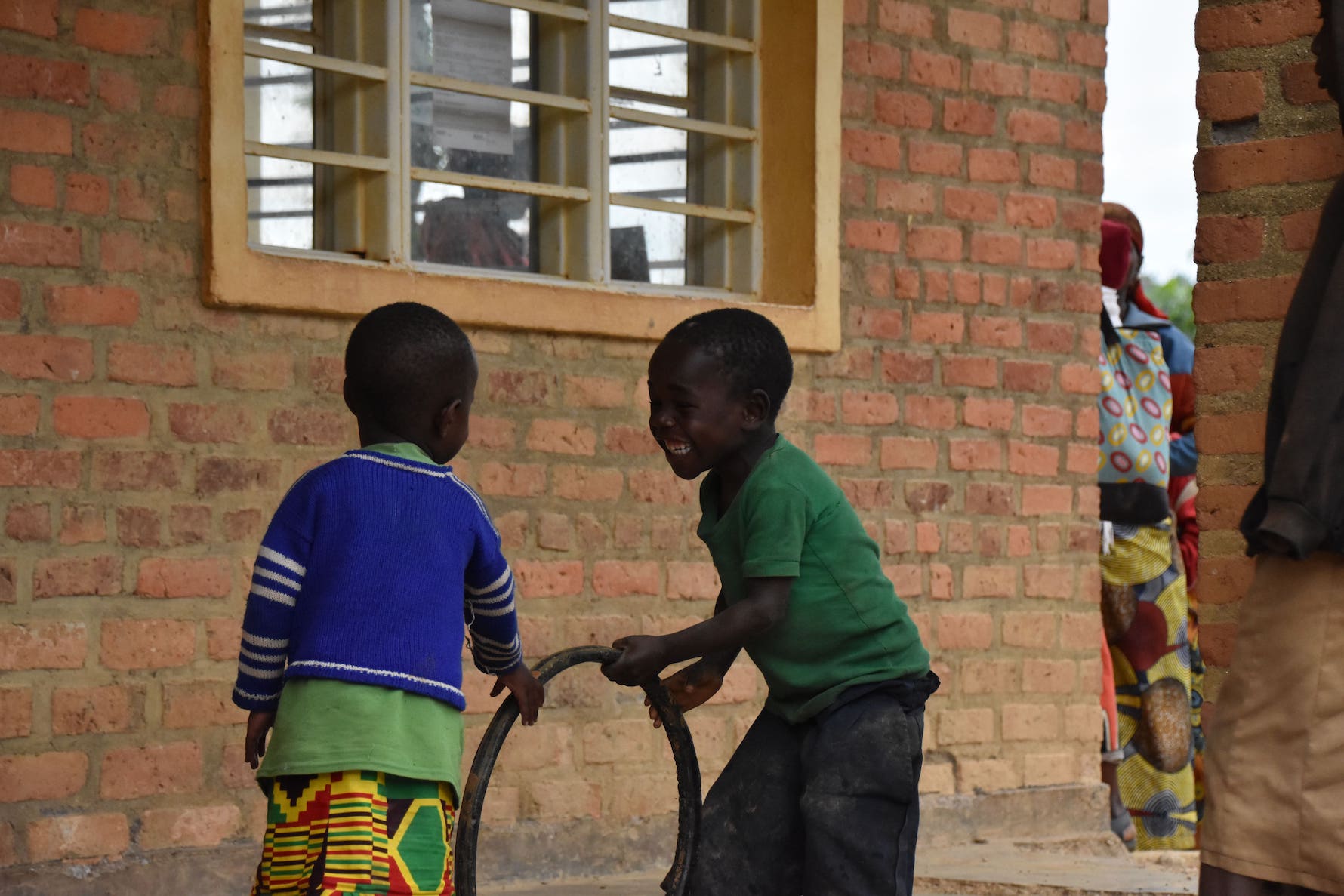
The impact of climate change
During its field visit, the Reforest'Action team conducted several focus groups with local populations. The aim of this co-construction approach was to generate qualitative discussions with the project's future stakeholders, in order to understand their day-to-day issues and needs, and to draw out useful lessons. During the workshops, participants expressed their concerns about the impact of climate change on their way of life. In the past, farming practices were governed by a certain predictability and stability that determined the seasons to be respected. The high fertility of the soil meant that no fertilizers of any kind were needed, while ensuring sufficient productivity. The availability of land was compatible with the practice of fallowing, essential to let the land regenerate. Finally, the lush forests provided a variety of resources such as mushrooms, wild fruits and small animals for gathering and hunting.
Nowadays, the situation in Rwanda has changed dramatically. Once-fertile soils are being diluted by rain, hills are eroding, biodiversity is collapsing, and crop yields are falling in a drastic way. Irregular rainfall, flooding and prolonged dry seasons prevent over-exploited plots from producing enough. To cope with declining productivity, farmers must apply organic and chemical fertilizers. Population growth, leading to the establishment of settlements in previously forested areas, exacerbates erosion problems. Another challenge is the lack of firewood and energy wood, essential for cooking and lighting. In the end, even by harming the environment, families are no longer able to meet their basic needs.
Poverty, the scourge of the country, hinders the population's ability to counter these changes. Farmers often do not have the livestock needed to produce enough organic fertilizer. Access to small loans is a challenge, given the high interest rates imposed by financial institutions. In addition, the lack of employment opportunities exacerbates poverty. To ensure food security, urgent and sustainable solutions must be put in place.
Umuganda, community work festival
In spite of harsh and worrying conditions, the Rwandan people remain united and determined to move forward. Meaning "uniting our forces towards a common destiny" in Kinyarwanda - the country's most widely spoken language - Umuganda is a symbolic holiday in Rwanda. It's a day when every individual can contribute to the well-being of the community. Every last Saturday of the month, Rwandans take part in public-interest projects. The tasks are varied, ranging from waste collection to tree planting and house building.
Everyone contributes to the creation of a more cohesive society, in the service of a stronger country, towards a more resilient planet.
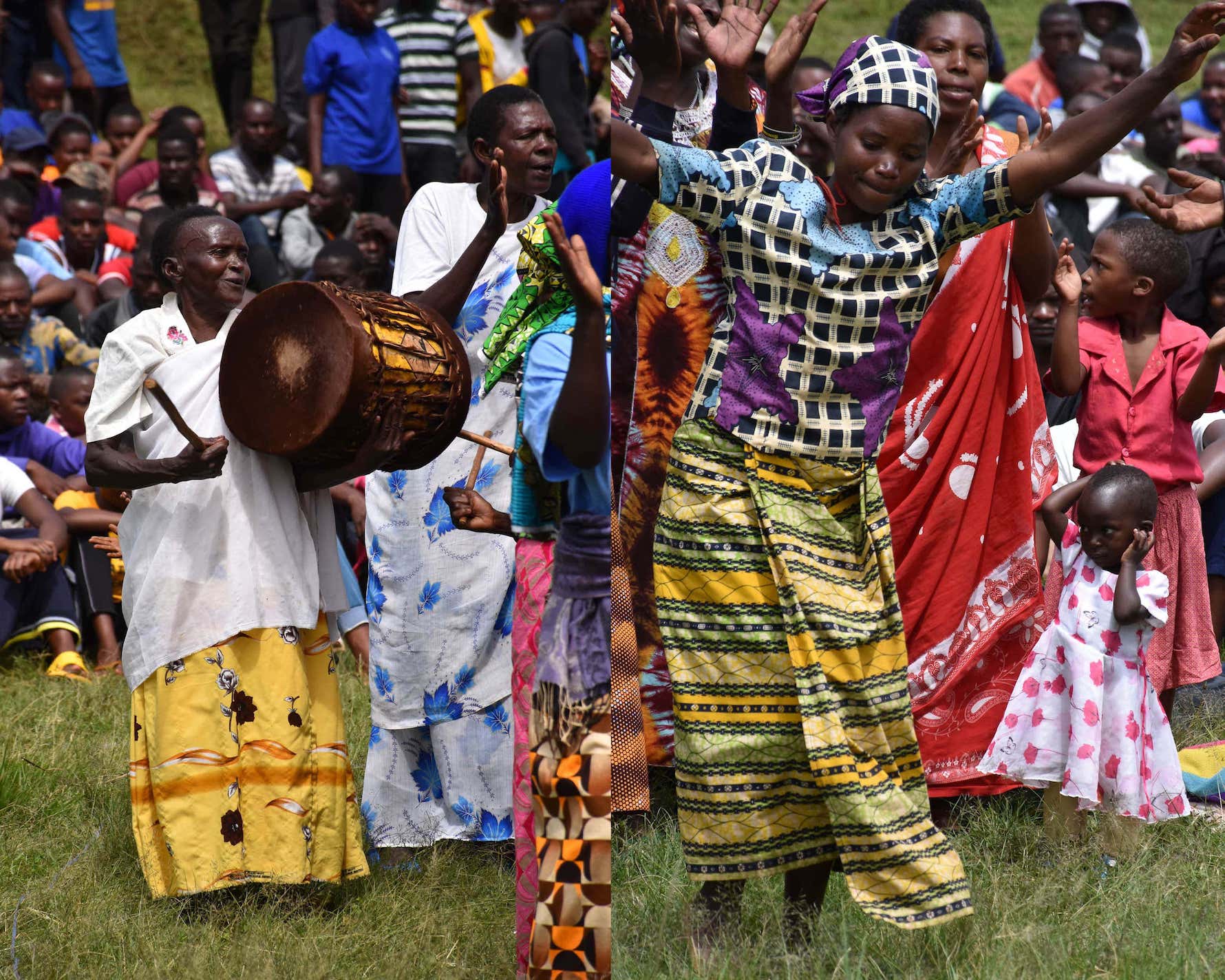
Rwanda, pioneer of climate resilience in Africa
Aware of the environmental issues threatening ecosystems and people, the Rwandan government has been quick to make serious, forward-thinking commitments. Since the creation of the Rwanda Green Fund (FONERWA) in 2013, President Kagame has raised over $247 million - enabling the country to reduce its CO2 emissions by 126,000 tons - and contributed to the rehabilitation of over 30,000 hectares of watersheds. A role model in Africa, the country is committed to meeting the Bonn challenge and restoring 2 million hectares by 2030. To achieve this goal, the authorities have undertaken major efforts to restore degraded ecosystems, notably in Gishwati National Park, cradle of the Mukura Forest.
Rwanda also boasts a high degree of geopolitical and economic stability. Since the end of the 20th century, Rwanda has made considerable efforts to ensure the safety and security of its territory and has been ranked as the second safest country in Africa*, in addition to being the fourth least corrupt**.
*2018 Gallup Global Law ** 2020 Transparency International
The MuLaKiLa project, design and benefits
Under its full name "Strengthening resilience to climate change and building sustainable agroforestry value chains around the Mukura Forest and Lake Kivu watershed", the MuLaKiLa project is located in the Western Province of Rwanda, encompassing the administrative districts of Rutsiro and Ngororero. Above all, the project area is anchored within two natural ecosystems of major importance: the Mukura Forest and the Lake Kivu.
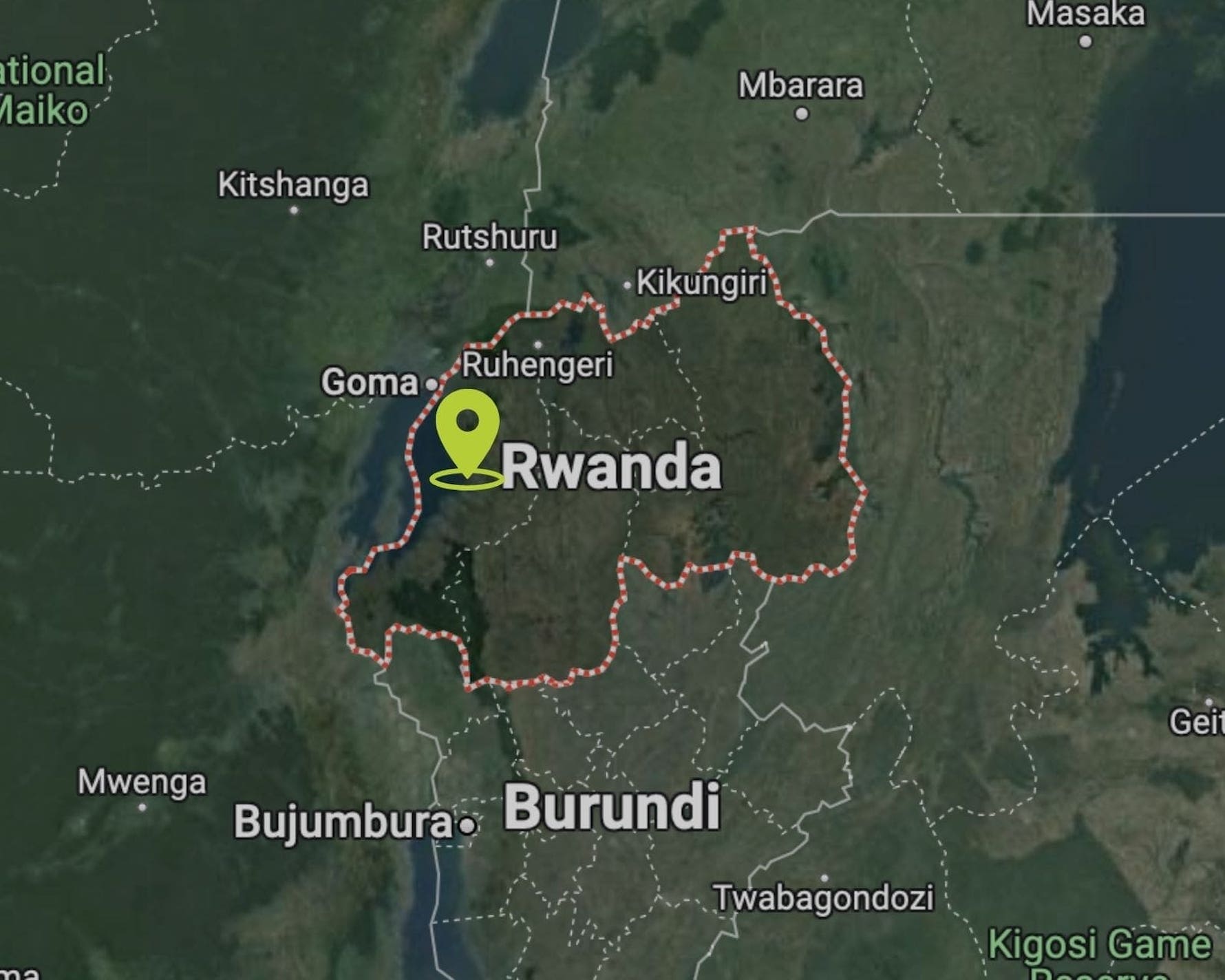
Gishwati Mukura National Park is Rwanda's last national park and has been on UNESCO's World Heritage List since 2020. It comprises two distinct forests: the larger, Gishwati, and the smaller, Mukura. Following the Rwandan genocide, many refugees settled here, clearing and deforesting to feed themselves. By the year 2000, almost all the forest cover had disappeared. While the Gishwati forest has benefited from an excellent restoration program in recent years, this is not the case for all the mountain ecosystems in the region. Extensive tea cultivation now covers the central and northern parts of the reserve. On the border between Rwanda and the Democratic Republic of the Congo, Lake Kivu is one of Africa's largest lakes, measuring 89 kilometers long and 48 kilometers wide. With volcanic origins, it drains a major river system.
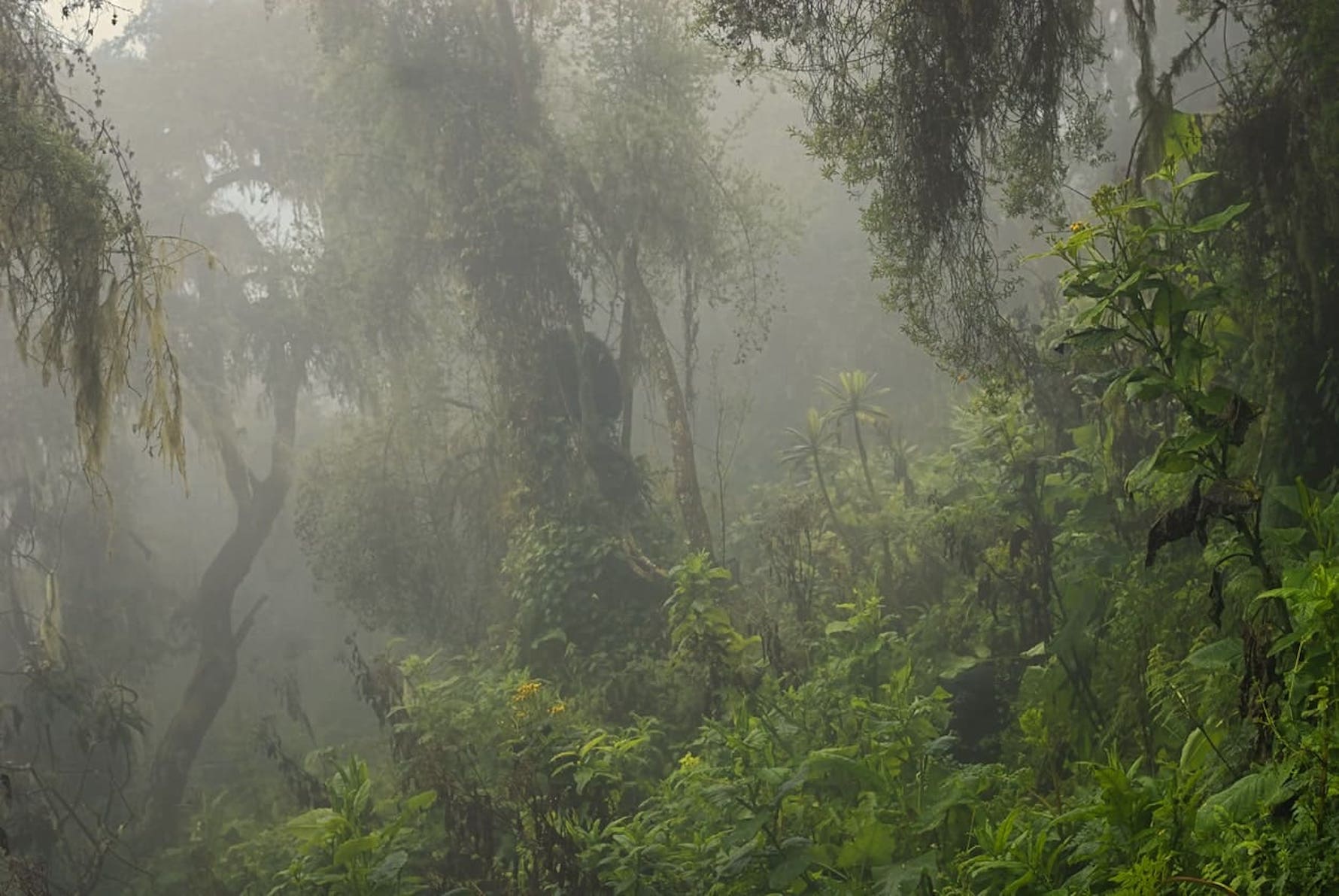
A multi-stakeholder partnership
The project is being carried out by the Albertine Rift Conservation Society (ARCOS) in collaboration with the Rwandan government and in partnership with Reforest'Action. As a team, ARCOS and Reforest'Action are jointly designing and implementing the project, then monitoring and evaluating the long-term impacts of its implementation. The MuLaKiLa project is being developed within the framework of the Circular Bioeconomy Alliance (CBA), established in 2020 by King Charles III. The design and implementation of this project follow the principles of this Alliance. AstraZeneca, a member company of the CBA, is financing the start-up of this ambitious project, thereby enabling its deployment as of today.
The design of the project relies heavily on participatory approaches. Consequently, stakeholder consultations will be an ongoing process throughout the entire duration of the project.
Ambitious goals
Starting in March 2023, the "pilot phase" of the project will last one year, while planting activities will be spread over 5 years, from 2023 to 2027. The overall aim of the MuLaKiLa project is to restore the ecological functionality of 20,000 hectares of agricultural ecosystems by planting around 4.6 million trees, mostly in agroforestry on small-scale traditional farms. The project will benefit over 40,000 families - almost 120,000 individuals - through the creation of 40 administrative cells, themselves made up of around 10 villages, each representing around 150 households.
Out of this total, the first year which has just started represents 3,000 hectares, 900,000 trees, more than 3,000 direct beneficiaries, 70 mobilized ARCOS members and 30 field technicians.
Designing a future nature-based carbon removal project
95% of the project is devoted to the development of agroforestry systems - representing 3 million trees planted in agroforestry - and the remaining 5% to the afforestation of watersheds. Agroforestry species (Alnus acuminata and Grevillea robusta), indigenous species (Nile trumpet, African plum, kratom, ficus, etc.) and fruit trees (avocado) will be integrated into the tea and coffee plantations (up to 15% of operations) and other cultivated land (up to 85%) of local farmers. With the aim of enhancing existing value chains while contributing to sustainable income generation, the planting of one million coffee trees will give rise to new agroforestry coffee crops. To facilitate farmers' access to young trees, 40 nurseries - one in each administrative cell - will be set up.
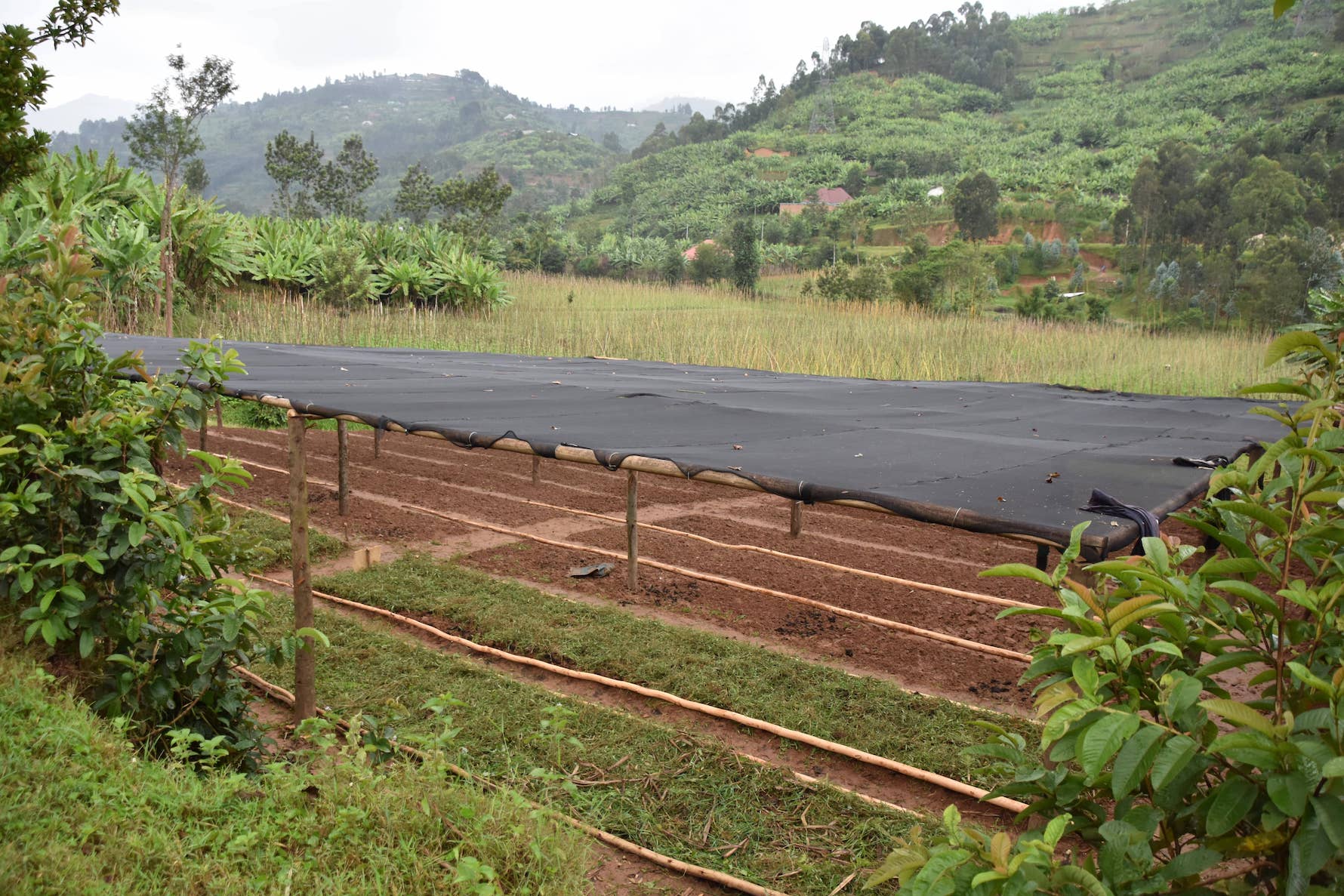
The feasibility study, which will enable the project to be converted into a nature-based carbon removal project for the next 30 years, began in December 2022 and is still ongoing. The partners are now moving step by step towards certification of the project by an international standard, which is key to its development on a larger scale. Based on the ALM* carbon typology, precise carbon sequestration calculations from the feasibility study have not yet been provided. *ALM = Agricultural Land Management
Focus on terraced farming
In Rwanda, 90% of the country's agricultural land is located on hilly slopes, with inclinations of up to 55%*. The creation of radical terraces therefore appeared to be a best-in-class solution to the erosion and landslide phenomena accentuated by the topography. Moreover, the flat soil of the terraces allows rainwater and agricultural inputs to be retained during bad weather. Today, this technique represents the main source of hope for Rwandan farmers to improve their living conditions. That's why the MuLaKiLa project design calls for the creation of terraces according to the degree of slope of the soil, an onerous and difficult process that is nonetheless necessary to ensure the resilience of the restored ecosystems. *Source: FAO
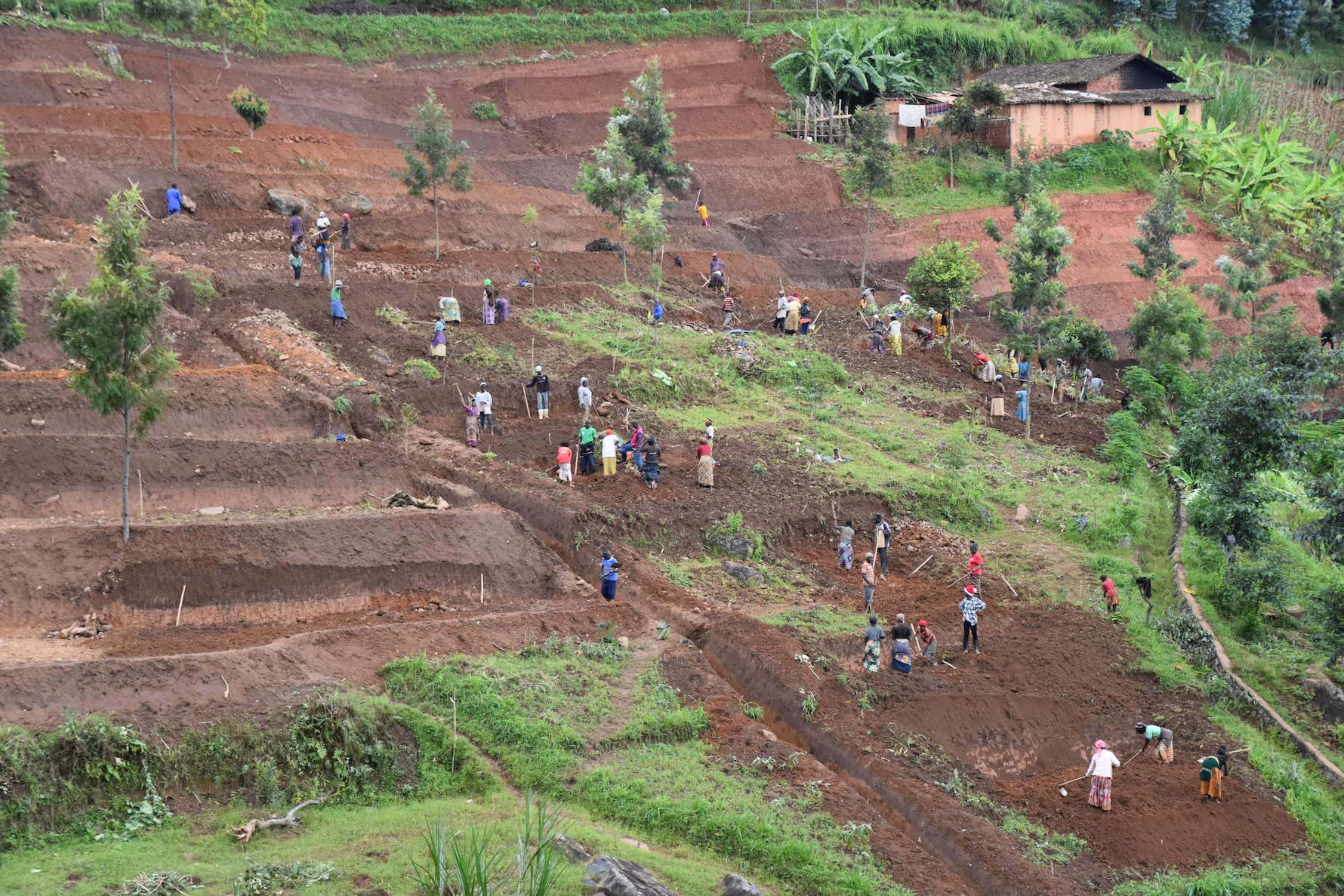
The benefits of sustainable farming practices
The planting of diversified tree species in agroforestry aims to modify current agricultural practices in order to establish virtuous and sustainable models, both environmentally and socially.
Benefits for ecosystem resilience
Agroforestry models implemented within terraced crops will restore eroded and leached agricultural ecosystems. Increased above and below-ground biomass will reduce soil erosion, provide nutrients, and improve soil fertility. Water retention, facilitated by trees, will be useful in dry periods. The selection of trees will include endemic species from the region, thus contributing to the preservation and development of native biodiversity.
Benefits for population resilience
Healthy ecosystems will help strengthen people's livelihoods. Improved value chains for tea, coffee and wood will support a network of local cooperatives created as part of the project. The main benefit generated will be a considerable gain in agricultural productivity, leading to improved food security for families. Avocado trees, planted on arable land, will provide an additional food resource. The project will support the efforts of rural communities through the implementation of an incentive system, as well as through the creation of a revolving fund that will promote their financial stability. The increase and diversification of household incomes will thus be ensured by facilitating access to various economic activities such as livestock breeding, horticulture, or commercial agriculture via regional and national markets.
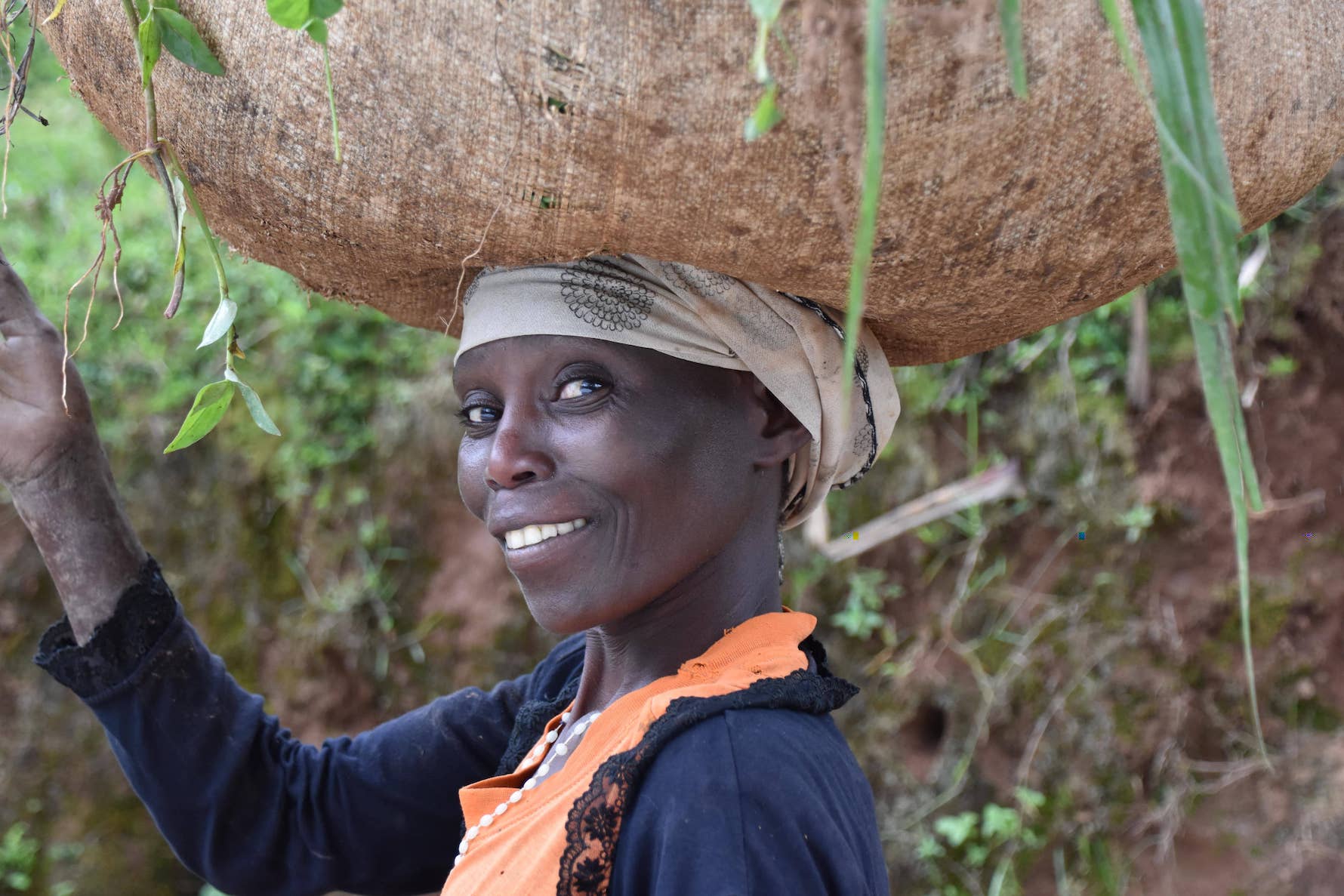
In March 2023, the first steps of a great ecological and human adventure were taken. Based on transparency and cooperation, the pilot phase of the MuLaKiLa project initiates long-term work with farming communities in the Rutsiro and Ngororero districts, with the aim of strengthening the link between the sustainability of their ecosystems and the preservation of their livelihoods. The launch of activities in the field will help to maintain the commitment made to the Rwandan government and all stakeholders, while certification of the nature-based carbon removal project is underway.